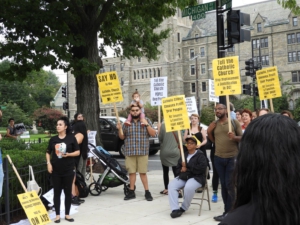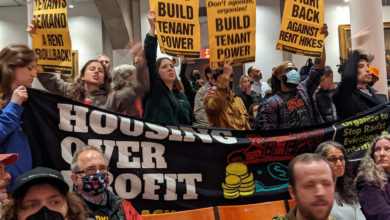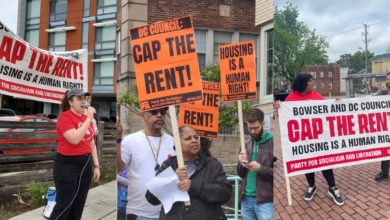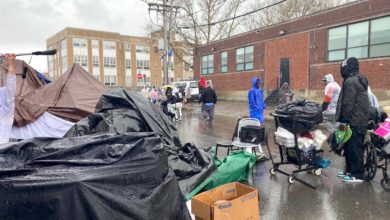Tenants of several units owned by the Catholic Church in Washington, D.C.’s Brookland neighborhood chalked up a key victory earlier this month when they secured the purchasing of their buildings from the Church by a developer who will not displace them or render their units unaffordable.
In September of 2018, 12 families in three buildings recently willed to the Basilica of the National Shrine of the Immaculate Conception feared imminent displacement after learning their buildings would be sold to developers who intended to abrogate their rent controls or displace them outright. However, the residents, supported by community members and groups such as LinkUp, Justice First and the Party for Socialism and Liberation, worked tirelessly to bring the Church to the negotiating table and to exercise their rights as tenants in the city.

While bourgeois media has tried to cast the victory as happening at the mercy of a philanthropic developer, the truth is that this victory was won by the people.
Their plight grabbed the district’s attention when residents organized a picket line outside the enormous church before Sunday mass, urging parishioners to demand the monsignor meet with the tenants, whose concerned were not being heard and upon whose Tenant Option to Purchase Act rights were being trod.
“As of July 19, our building is no longer owned by the Basilica of the National Shrine of the Immaculate Conception,” a statement by the 636 Girard St. NE Tenant Association reads. “We have secured the ability of all tenants to stay, and we all have the option to buy or return to rentals far below market rate. Additionally, the building is still under rent control, ensuring that tenants with disabilities don’t see any increase above normal.”
“The development agreement and sale of the building means that my family and neighbors can breathe and rest a bit easier, knowing that we are one step closer to avoiding displacement,” Heather Benno, a member of the PSL and one of the tenants of the Basilica’s buildings, told Liberation News.
“The Basilica no longer owns the building and we have partnered with a developer who committed to preserving affordability. Nevertheless, we still need the D.C. government to step up and support community-led development, like this, rather than private, for-profit development at tenants’ expense,” she said.
“Through this process, 12 families and the surrounding community learned that working families can only avoid displacement through struggle and unity,” Benno said. “Despite living under a harsh system that prioritizes profit over housing, victory is possible!”
“This victory probably carries a totally different meaning for my family,” Julius Tumushabe, who came to the U.S. from Uganda 12 years ago and has lived in one of the buildings ever since, told Liberation News. “More than once in our lives we’ve been displaced and forced out of our homes (even out of our country) by powerful entities. This victory has proved that the poor can prevail over the rich and powerful if they come together and resist, and that no one should unjustifiably be removed from their home.”
“Our sincere gratitude to all who fought with us through this testing battle,” Tumushabe said.
The agreement followed months of negotiations in which the residents received little help from the Department of Housing and Community Development, a District of Columbia agency whose mission is purportedly “to create and preserve opportunities for affordable housing and economic development and to revitalize underserved communities” in the city.
“Due to hard work, perseverance and relentless organizing, the first building of the project has been sold to a community developer who has signed a contract committing to work with the tenants and not displace them,” LinkUp organizer and PSL member Yasmina Mrabet said.
Mrabet told Liberation News, “This victory, which takes place in the context of rapid gentrification in Ward 5, proves that it is possible for residents to have their housing interests represented at a bargaining table across from any developer or landlord – in this case the Catholic Church – that is attempting to turn a profit by displacing renters. What bargaining table am I talking about? The one that we create through organizing and exercising our collective power.”
Messages of solidarity poured out following the win, including from other tenants unions in the city’s Northeast quadrant fighting to resist their own displacement. “Like we said back in September of last year in a solidarity letter to them, we are all in this fight together against displacement and for affordable housing,” the Brookland Manor/Brentwood Village Residents Association wrote on Facebook.
In a study by the National Community Reinvestment Coalition published earlier this year, D.C. was ranked as the third most rapidly gentrifying city in the country, noting that more than 20,000 Black residents were displaced in favor of affluent white residents between the years 2000 and 2013. Further, a study published last month by the D.C. government found a vast discrepancy between the city’s affordable family housing supply and need – one particularly pronounced in Ward 5, where some of the most aggressive gentrification is occurring.
Washington, D.C.’s Area Median Income is $121,300 for a household of four, according to the U.S. Department of Housing and Urban Development. With an average citywide rent of $2,131 per month, in 2017 only 12.7 percent of single-family houses or condominium sales would have been affordable to a household making $88,000 a year, which is considered low-income. As of last year, the median annual income for black families in the city was just $37,891.
“A minimum wage worker would have to work 104 hours or have 2.6 full-time jobs to afford a two-bedroom apartment in D.C. To afford a one-bedroom apartment, a minimum wage worker would have to work 91 hours or have 2.3 full-time jobs,” Greater Greater Washington reported in January. D.C.’s minimum wage increased from $13.25 to $14 an hour on July 1, so these numbers are slightly off, but the situation remains the same. The inequality in access to housing is drastic.
Benno had a word of advice for others facing displacement and denial of their rights by their landlords: “Tenants must be organized before a crisis, to build community power in negotiations with landlords and developers. When buildings are sold, tenants should assert their role in negotiations and their full rights as early as possible and consult community resources for support.”
Only through socialism can we ensure the universal human right of safe housing for all people. This victory proves that when we come together and fight for our rights, we can win, even with the official institutions of government against us.






